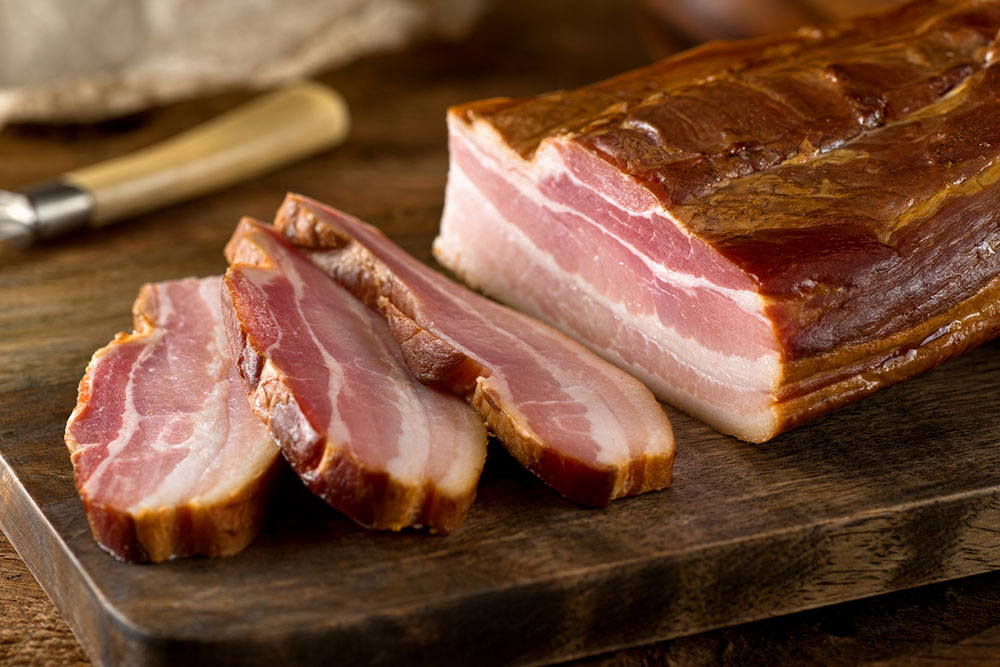
11 foods that can trigger breathing difficulties
The lungs are vital organs in the human body that facilitate the respiratory process by ensuring oxygen is brought into the body, enabling one to breathe. Therefore, each individual must keep the lungs healthy to improve overall well-being. However, certain things could worsen lung health, including some foods in one meal regime. These foods may often lead to conditions like asthma and COPD and trigger breathing difficulties. Let’s look at the 11 trigger foods for the lungs.
Bacon
Most people enjoy bacon for breakfast or other meals of the day. However, processed meat is unhealthy for one’s overall health, including the lungs. Bacon is often treated with additives and preservatives to enhance the flavor and prolong shelf life. But these added properties are linked with an increased risk of developing chronic obstructive pulmonary disease (COPD), which may trigger breathing difficulties. Other processed meats equally bad for lung health include ham, hot dogs, and sausages.
Vegetable oil
It isn’t uncommon for people to use vegetable oil for most of their cooking. But this could have adverse effects on their health and also damage their lungs. Some vegetable oils contain unhealthy fats that could trigger heart diseases, increased inflammation, and excessive mucus production, which may consequently affect an individual’s breathing. A few products to steer clear of include canola, soybean, sunflower, grapeseed, and safflower oil. One could consider healthier options instead, such as olive oil.
Sugar
Sugar is considered one of the unhealthiest ingredients that one can add to their meals. It can lead to increased mucus production in both healthy people and those affected by asthma. Moreover, asthma patients were found to have a more significant reaction to sugar, indicating that it could play a role in worsening the condition and triggering breathing trouble. Hence, it is advisable to either reduce sugar intake to zero or consult a healthcare professional to determine the ideal daily value.
Carbonated beverages
Carbonated beverages are popular among people of all ages, but they have been linked to an increased risk of asthma in both adults and children. This is because carbonated drinks contain carbon dioxide, which can cause bloating and difficulty breathing. Additionally, these beverages are often high in sugar and caffeine, both of which can be harmful to the lungs and cause rapid breathing. Therefore, it’s best to limit the intake of carbonated drinks to maintain good respiratory health.
Bread
Bread is a staple food in most people’s meal regimes. Unfortunately, the food has unhealthy traits associated with poor lung health. Excessive intake of white bread may put one at a greater risk of asthma, wheezing, shortness of breath, and chest tightness. Moreover, consuming two slices of bread or more daily is linked to a higher risk of chronic rhinosinusitis with nasal polyps.
Eggs
Eggs contain huge amounts of proteins and nutrients, such as selenium. Unfortunately, experts indicate that the food might not be the best option for someone at risk of lung diseases. Eggs may trigger histamine release in the body, which may set off an excessive production of mucus. This may also occur due to an immune response to ovalbumin, which might be an allergen for some people. One should note that they could consume eggs in moderation after consultation with a healthcare professional, especially if they require the food’s nutrients.
Corn
Corn is a popular food that has many implementations in various dishes globally. It is also considered healthy as it aids digestion and gut health, improves eye health, and protects the heart. However, those at risk of lung conditions might have to exclude the food from the meal regime. Experts believe it may trigger immune and respiratory problems due to its mycotoxin content. Other studies show that eating corn was associated with more sneezing, runny nose, and an increased risk of asthma attacks in some people.
Salt
This ingredient makes it into most meals to introduce flavor to the food. However, consuming salt is linked with an increased risk of pulmonary hypertension and may also contribute to the development of chronic bronchitis. Consuming too much of the ingredient could trigger inflammation in the body and increase music production, which will add to one’s breathing trouble.
Milk
Drinking milk is a great way to improve one’s calcium intake. However, dairy products may have negative effects on people at risk of lung complications. Milk can trigger an increase in mucus production in the respiratory tract. Other dairy products, such as cheese, can also increase the histamine levels in the body, which increases airway inflammation and mucus production, which triggers symptoms like breathing difficulties. If one must drink milk or consume dairy products, one should consult with an expert about the recommended daily value to avoid potential side effects.
French fries
Fried foods such as French fries may affect various parts of the body, including the lungs. The food is high in unhealthy fats, which might increase inflammation in the body. French fries may also contain trans fats, an unsaturated fat produced during the hydrogenation of oil. Such properties are extremely dangerous and may increase the unhealthy cholesterol levels in the body. Consequently, one may suffer from an increased risk of heart disease, stroke, inflammation, and diabetes. Fried foods may also damage alveoli in the lungs, resulting in high oxygen release into the bloodstream, making breathing difficult.
Shrimp
People at risk of lung complications like breathing difficulties should avoid eating shellfish like shrimp. The seafood contains high amounts of purine, which converts uric acid into the body. The process may lead to lung inflammation and increase the risk of conditions like COPD. The composition of shrimp is also a common allergen that may trigger anaphylaxis, and its symptoms, including breathing difficulty, swelling of the airways, and reduced blood pressure levels. Therefore, those with asthma or a high risk of COPD should consider other protein sources to maintain their lung function and health. Other shellfish that one should avoid are prawns and lobster.


